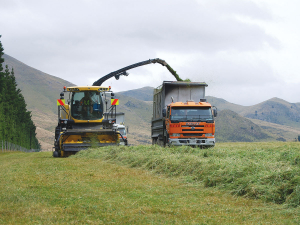Visa changes bring fresh woes
Rural Contractors NZ says members are frustrated at having to work through more layers to get visas approved for skilled seasonal machinery operators ahead of the imminent season start. Andrew Olsen comments.
 RCNZ chief executive Andrew Olsen says bringing together a comprehensive regime and qualification will take some time.
RCNZ chief executive Andrew Olsen says bringing together a comprehensive regime and qualification will take some time.
Agricultural contractors are taking steps to attract and train more local talent.
However, the industry says it will still need to rely on experienced overseas workers to help with peak season workloads for some time yet.
A newly formed National Training Council (NTC) for rural contracting was recently established. Rural Contractors NZ (RCNZ) chief executive Andrew Olsen, who was confirmed as the inaugural NTC chair, says it has gotten off to a flying start.
"We've confirmed our membership and objectives, set priorities and made a start to defining all the issues we need to work through to get a new, higher-level training regime in place for rural contracting."
Olsen says they had a good roundtable on all the factors necessary to get more and better trained people into the critically labour-short sector at its first meeting. He says there were a slew of contributions on how to improve training in the industry.
"A lotof our businesses are quite small and can't easily afford to carry trainees through the off-season. Balancing that is the fact that employers large and small need to find a way to make more provision for on-the-job training."
Olsen says while some contractors have been able to recruit more New Zealanders it's accepted that continuing to attract people to the industry will be improved by having good qualifications available.
"We looked at the Hanzon Mentor program (funded by RCNZ) which this season enrolled nearly 100 locals in its app-based record of learning - with most under 24 years old," he adds. "We then discussed if contractors could connect that pool of resources into more formal training."
Olsen adds that there's acceptance by the NTC that classroom-based learning is necessary but this needs to be more than balanced by on job practical experience.
He says more centres of learning equipped to deal with agricultural training woud help deliver the necessary classroom components around health & safety, pastoral care, fatigue management and skills and licences in heavy traffic and machinery.
Olsen says bringing together a comprehensive regime and qualification will take some time.
"We need the Government to recognise that you can't whistle up a new qualification and deliver it in a few months," he adds. "Meantime, our contractors and and country will require skilled overseas workers for the foreseeable future."
Olsen says the NTC will also look to MPI and other government agencies for support - including to research a labour exchange program with overseas rural contractors and a mentoring program.
"There's also a wish to explore wider employment options for trainees to continue their learning, reduce the burden on employers in the off season and to design a call to action to get more contractors involved in training."
Waikato dairy farmer Neil Bateup, made a companion of the New Zealand Order of Merit (CNZM) in the New Year 2026 Honours list, says he’s grateful for the award.
Another Australian state has given the green light to virtual fencing, opening another market for Kiwi company Halter.
Farmer interest continues to grow as a Massey University research project to determine the benefits or otherwise of the self-shedding Wiltshire sheep is underway. The project is five years in and has two more years to go. It was done mainly in the light of low wool prices and the cost of shearing. Peter Burke recently went along to the annual field day held Massey's Riverside farm in the Wairarapa.
Applications are now open for the 2026 NZI Rural Women Business Awards, set to be held at Parliament on 23 July.
Ravensdown has announced a collaboration with Kiwi icon, Footrot Flats in an effort to bring humour, heart, and connection to the forefront of the farming sector.
Forest & Bird's Kiwi Conservation Club is inviting New Zealanders of all ages to embrace the outdoors with its Summer Adventure Challenges.